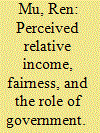| Srl | Item |
| 1 |
ID:
109627


|
|
|
|
|
| Publication |
2011.
|
| Summary/Abstract |
With rapid economic growth and industrial expansion, China consumes more coal than any other nation. Therefore, it is particularly crucial to forecast China's coal production to help managers make strategic decisions concerning China's policies intended to reduce carbon emissions and concerning the country's future needs for domestic and imported coal. Such decisions, which must consider results from forecasts, will have important national and international effects. This article proposes three improved forecasting models based on grey systems theory: the Discrete Grey Model (DGM), the Rolling DGM (RDGM), and the p value RDGM. We use the statistical data of coal production in China from 1949 to 2005 to validate the effectiveness of these improved models to forecast the data from 2006 to 2010. The performance of the models demonstrates that the p value RDGM has the best forecasting behaviour over this historical time period. Furthermore, this paper forecasts coal production from 2011 to 2015 and suggests some policies for reducing carbon and other emissions that accompany the rise in forecasted coal production.
|
|
|
|
|
|
|
|
|
|
|
|
|
|
|
|
| 2 |
ID:
193205


|
|
|
|
|
| Summary/Abstract |
The growing India-Japan engagements are not only focused on economic issues, but also cover a wide range of interests, including regional security, political, and maritime security concerns. Both countries are consolidating strategic partnerships to address the risks and vulnerabilities posed by the evolving regional balance of power. Through their embeddedness with China, both India and Japan form an intrinsic part of the Indo-Pacific geopolitical security architecture. The key transformation of relations between these two states in the region is in response to the geopolitical change brought about by China’s rapid ascension. In this regard, the article further explains how both countries are systematically strengthening a strategic partnership and gradually reinforcing economic, political, security, and strategic cooperation against China. This article seeks to address how both states would restrain rising China’s strategic maneuvering in the Indo-Pacific region through an analysis of the India-Japan alignment, with the main focus of this study being on analyzing how both India and Japan are now investing in a long-term strategy to balance China’s hegemonic policies.
|
|
|
|
|
|
|
|
|
|
|
|
|
|
|
|
| 3 |
ID:
187856


|
|
|
|
|
| Summary/Abstract |
Previous studies have shown that Chinese citizens generally are optimistic about their economic opportunities and tolerant of the high levels of inequality in their society. This paper conducts a random survey experiment to examine whether the established views on fairness and inequality change after the respondents receive the general information on wealth concentration or the customized information on their household income ranking. We find that both types of information lead respondents to view society as less fair than they had initially believed. The information on the wealth concentration also increases public concern about social inequality. Nevertheless, neither information offered to the respondents make them think that government should play a more significant role in reducing inequality. This lack of demand for government intervention may be partially explained by a lower level of trust in the local government induced by the two information treatments.
|
|
|
|
|
|
|
|
|
|
|
|
|
|
|
|